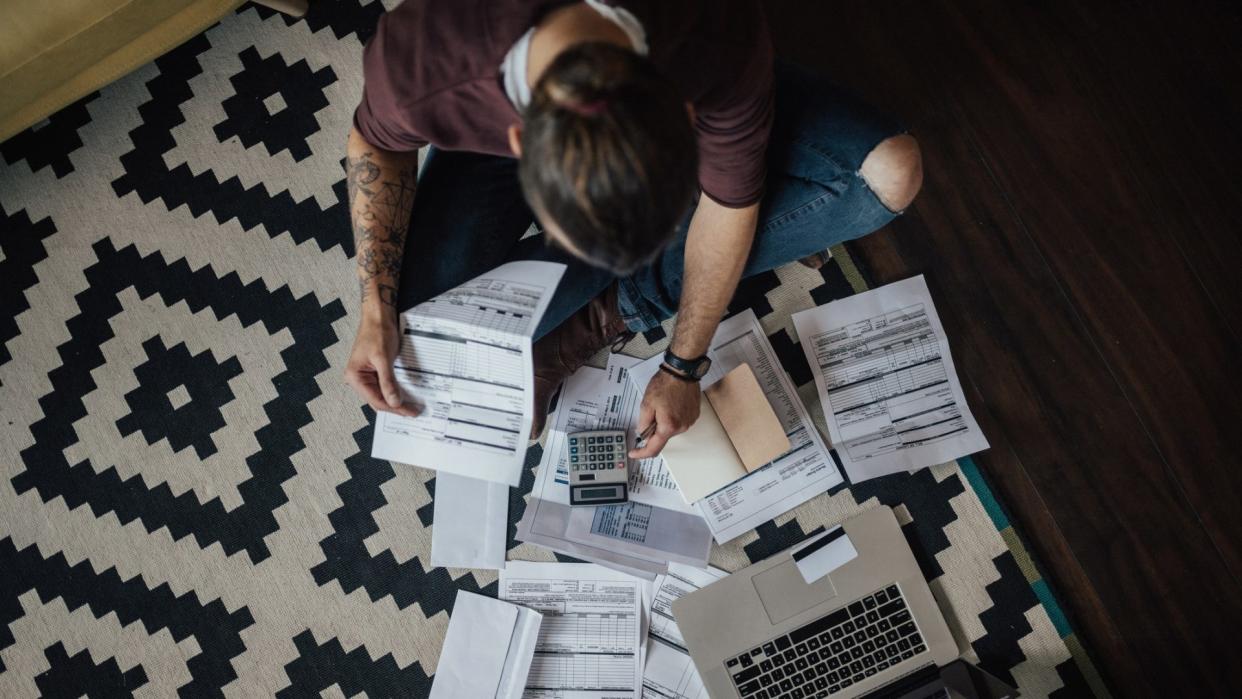10 Practical Tips To Get Ahead of Your Debt

People don't set out in life with the intention to accumulate debt, but it's pretty likely that most people will to some degree. From student loan debt to credit card debt, it's sometimes a necessity for just getting by.
Here It Is: Our 2022 Small Business Spotlight
Find Out: 7 Things You Should Never Do When Planning for Retirement
Financial advisor Michael Ryan, founder of the financial literacy website michaelryanmoney.com, reminds people in debt, "Debt is at an all-time high, so know you are not alone in facing this problem. The COVID crisis has certainly not helped. But it isn't a helpless situation."
Since most people won't be able to pay off their debt in full -- not at first, at least -- we asked experts to suggest some practical (and hopefully less stressful) ways to chip away at your debt.

Assess Your Situation
First you need to assess your situation, Ryan urges. "Pull a free credit report and take an inventory of your situation. It is a good time to do a complete net worth statement as well. This is your starting point. It's Like GPS -- you can't get directions to where you are going if you don't know where your starting point is."
Live Richer Podcast: First-Time Homebuying During Inflation: Is It Worth It?

Cut Discretionary Spending
Katie Ross, executive vice president for the national financial education nonprofit American Consumer Credit Counseling (ACCC), recommends you pull back on your discretionary spending, such as streaming services, eating out, new clothes you don't need and so on.
"This can be admittedly a tough thing to do, but the savings add up. The more money you can put toward your debt, the better it will be. It's not a quick solution to paying off debt, but at least you'll know you're doing all you can."

Use the Debt Avalanche Method
If you want to pay off multiple debts quicker, and pay less interest, Ross also recommends the debt avalanche method.
"This is where you pay debts in order of interest rate. Start with the highest interest rate. Focus on paying off one balance at a time while [continuing to pay] the minimum balance on all the other debts."

Negotiate for Forgiveness, Refinancing or Better Rates
If you have student loans, Ryan recommends you look into forgiveness and income-based repayment plans to give you a little breathing room. If you own a house, he says, "Consider refinancing and consolidating all of your debt. This is often frowned upon, but the benefits outweigh the downsides."
You can also try negotiating with your credit card companies and other debtors, Ryan says. "You would be amazed how low risk, high reward a five-minute phone call may be. Simply explain your situation and see what they offer. Usually, they will improve upon their initial offer, so keep asking. Zero percent interest for a year, balance transfer, a hold on payments for six months. Whatever the result, it costs you nothing and could be the life raft you were needing."

Establish a Budget
The most efficient way to get control of your debt is to establish an efficient budget, says Zachary A. Bachner, CFP, with Summit Financial. "By tracking every dollar of income and every expense for the month, you can pinpoint which areas of the budget can be adjusted to free up additional cash flow. This excess cash flow can then be applied towards repaying debt or set aside for retirement savings."
Even freeing up as little as $20 per month by cancelling a single subscription service can be applied to your debt and make a difference.

Make Consistent Monthly Payments
Always make minimum payments on all debts, says Lea Satterfield, a financial coach and educator and founder of MPower financial coaching courses. Of course, it's even better to make more than minimum payments when you can, but she says, "Protecting your credit score is always critical to long-term financial health."

Put Extra Money Toward Debt
Satterfield suggests that when you have extra income such as a work bonus, gift money or inheritance, put that money toward paying down debt.
And, if you do put that extra money toward debt, Satterfield says it's probably best to put it first toward the debt with the highest interest rate, and work your way down to the debt to the lowest interest rate (avalanche style). Alternately, she says you could choose to pay more on debt with lower balances so that you lower the number of debts you have quicker (snowball method).

Start a Financial Journal
Carma Peters, president and CEO of Michigan Legacy Credit Union, recommends you document your income and expenses in a physical or digital notebook to identify where to make adjustments or find opportunities to save. Putting information in writing can be illuminating, and a great step toward making change.

Make Cash Your King
According to Peters, another very practical way to avoid debt is to "stop using your credit card and start paying cash when possible, to keep a close eye on your spending."

Consolidate Your Debts
Lastly, if debt is truly way out of control, consider debt consolidation, says Nick Hodge, Founder of Daily Profit Cycle. "Consolidating your debts will speed up the process of paying them off. To consolidate your obligations, you take out an individual loan from an established bank or other financial institution. You'll only have one loan and one monthly payment to worry about now."

Remember, Change Is Hard
Above all else, go easy on yourself, Peters advises, because change is hard. "Most people never change their habits, so it takes a true desire to get to a different outcome. You must be so discouraged by where you are now that you want to make changes that will create a different trajectory for the rest of your life."
More From GOBankingRates
States Whose Economies Are Failing vs. States Whose Economies Are Thriving
Check Out Readers' Favorite Small Businesses in Our 2022 Small Business Spotlight
Looking To Diversify in a Bear Market? Consider These Alternative Investments
This article originally appeared on GOBankingRates.com: 10 Practical Tips To Get Ahead of Your Debt
